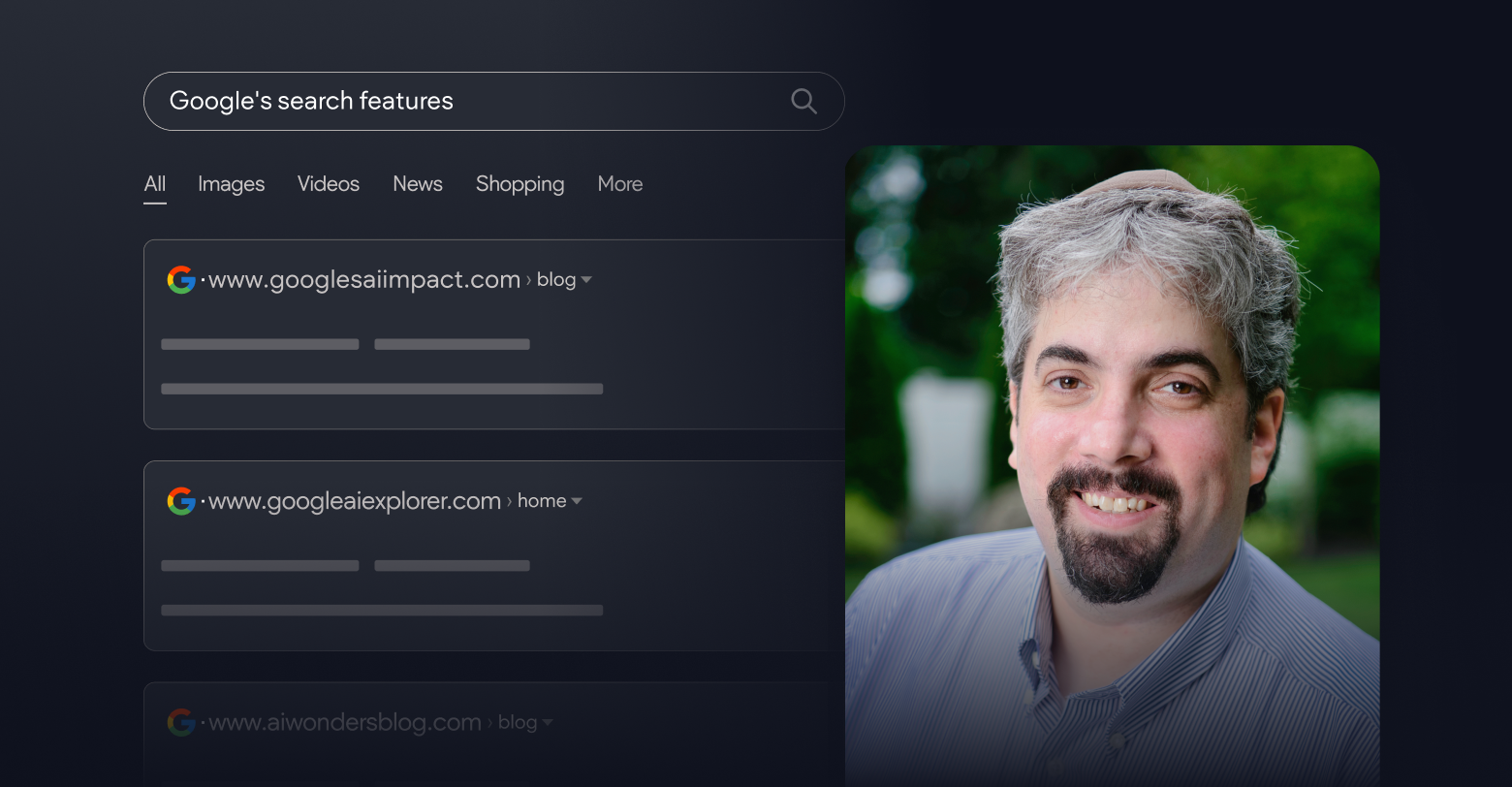We recently had the privilege of interviewing Barry Schwartz, a renowned SEO expert and journalist, to gain insights into the latest Google trends, challenges, and strategies.
Barry Schwartz is the CEO of
RustyBrick, a New York-based web service firm specializing in customized online technology that helps companies decrease costs and increase sales. He is the founder of the
Search Engine Roundtable and has covered search for over 20 years. Additionally, Barry is the News Editor at
Search Engine Land, hosts the Search Marketing Expo in Israel, and is a frequent speaker and moderator at major search marketing conferences worldwide. With an impressive background and numerous accolades, including the Outstanding Community Services Award from Search Engine Land and the US Search Personality of the Year, Barry is a highly respected voice in the industry.
The interview
In our interview, Barry shares his thoughts on various pressing topics in the SEO world, from the impact of AI on organic traffic to the implications of Google's latest updates.
Here are the questions and answers from our conversation:
Q: We're always impressed by your depth of knowledge. Could you share some additional blogs, publications, and industry experts you find insightful and follow?
Barry Schwartz:
“I would hate to share just a few and miss some specific experts in the field. This is why, on a daily basis, in my news recap, I share additional blog posts, publications, and industry expert insights from literally thousands of unique individuals across the industry. So if you want to follow those individuals and those insights, just check out my newsletter which is also published online over
here.”
Q: What are your thoughts on the recent leak of 14,000+ Google search ranking features? Do you believe it's legitimate, and could Google have leaked it intentionally? What could be the implications for SEO?
Barry Schwartz: “I do believe this is a legit leak, but I do not think it was leaked intentionally. From everything I know about Google, both on and off the record, the details in the leak seem very real. I also highly doubt Google would leak it on purpose; plus, it was “leaked” technically before the AI Overview debacle, so I don’t think it was intentional. That being said, overall, it still comes down to writing and publishing content and webpages that users want to link to, click on, and spend time on. So the long-term strategy has not changed for most SEOs. But maybe some SEOs will find some hidden gems that they might want to try to exploit in the short term. But overall, this really does not change how SEOs should do their jobs. But boy, is there a ton of useful nuggets in this leak.”
Q: What is your perspective on the recent unfavorable news regarding Google's AI Overviews? In your view, what implications might AI Overviews have on organic traffic, and how do you foresee AI Overviews shaping the SEO landscape?
Barry Schwartz:
“I am not surprised by the unfavorable news regarding AI Overviews. All year long, when Google was testing them, we saw some really bad examples of these AI Overviews. So when Google launched it to everyone, sure, people would see more and more examples of bad AI Overviews they can share—and they did. We had something similar when Google launched featured snippets; there were so many bad examples of Google getting it wrong there. I don’t think Google will turn off these AI Overviews. I think Google will continue to say most of the AI Overviews are good and useful, and of course, there will be bad examples here and there. That being said, they will continue to improve and get better, and this will blow over, like other stories have in the past. I think ultimately, despite what Google said, AI Overviews will lead to fewer clicks to publishers, not more. But at the same time, SEOs and publishers will want to be in these AI Overviews for brand recognition and visibility. So we will play Google’s game, write content that Google uses in AI Overviews, and hope we show up there. It is sad, but this is where we are now.”
Q: With Google and Reddit partnering up, how will SEO strategies change? What impact might this have on search results and how users discover information online?
Barry Schwartz:
“I see a bunch of SEOs saying we need to put our content on Reddit since Google is ranking Reddit really well. I don’t think that is a good long-term strategy. I can’t imagine Google will continue to rank Reddit as well as it ranks Wikipedia in the long term. I can be wrong, but I think the long game will still be to write content on your own site. Sure, people can share that content on Reddit, and other social media and forums, but you should have the content originate on your own domain and on your own site that you control.”
Q: Bing was the first search engine to use AI, Google second, but now Google has added many AI capabilities. Do you feel that Bing achieved something by being the first one?
Barry Schwartz:
“Microsoft created a lot of buzz and some very good PR for the company and for the CEO. Plus, it did seem to make Google “dance,” as Satya Nadella said. But it did not make a dent in Google’s search market share and probably won’t anytime soon. You don’t have to be first to be the best; Apple wasn’t the first company to make cell phones or computers.”
Q: What are your thoughts on the impact of Core Web Vitals on SEO? What should agencies focus on to ensure their clients' websites perform well in this area?
Barry Schwartz:
“There are so many more important things to focus on than Core Web Vitals. I mean, if your site is insanely slow, then work on speed and performance optimization. But I would spend almost zero time focused on Core Web Vitals for SEO purposes.“
Q: What are some common SEO mistakes you hear agencies make, and how can they avoid them?
Barry Schwartz:
“There are too many SEO myths out there. So this is hard to say. The best thing you can recommend is that don’t do things just for “SEO reasons.” Do things to your website because it makes sense for your users and makes sense for your business. If doing something for SEO seems and feels wrong, don’t do it.“
Q: Quite recently, many new search engines were born, like You.com. Do you think they stand a chance?
Barry Schwartz:
״No. There have been countless search engines that have come up in history, and they all pretty much have failed. So many headlines have come out about the “next Google killer,” those search engines are no longer around. So no, I don’t think they stand a chance. I wish they did, but they do not.״
Q: Everyone is talking about quality content in regards to the use of AI, but ‘quality’ is such a broad term. Can you explain how Google evaluates content and what is important to have in quality content?
Barry Schwartz:
“This is hard to say; ultimately, I don’t think about content quality when I write. I just want to write something that my readers will enjoy and find useful (dare I say helpful). I don’t care about how many words I write per article, I don’t care about keyword density, where my header tags are, and so many of those small SEO things. Of course, you can read Google’s take on content quality over
here.”
Q: What can you tell agencies about the latest Google update? What should they inform their clients about regarding this update? Will clients potentially lose rankings, and how should they address this?
Barry Schwartz:
“Just keep doing what is right for your users. I know it is hard, especially if you were hit by the
September helpful content update. But Google is really looking bad these days around search quality, and Google has even said they hear the feedback and are making changes based on the feedback. So keep building and improving your site, and ultimately, hopefully, Google will reward it. If they don’t and you truly have the best site, people will go to other search engines to find better quality results.”
Q: What are some emerging trends in SEO that agencies should be aware of (besides AI) and start preparing for now?
Barry Schwartz:
“Okay, sure, AI is the big one now. I would spend some time now going through the data leak; it has some interesting stuff in there or at least read what some SEO professionals are saying about it. I do wonder if there will be any big changes to structured data in the coming years. There has also been a trend on producing and marketing shorter content, shorter videos, more “glanceable” content—because the younger generation has a shorter attention span. So look for ways to slice up your content into more digestible and shorter pieces to be shared as videos, shorts, on TikTok, etc.’
Final Note
Barry’s insights on the recent Google leak and the impact of AI Overviews, along with other ‘hot’ SEO topics, offer clear guidance for agencies. His perspectives emphasize the importance of creating user-friendly content, staying updated with industry changes, and adopting sustainable SEO strategies for the long run.
Thank you, Barry - it was a pleasure.








